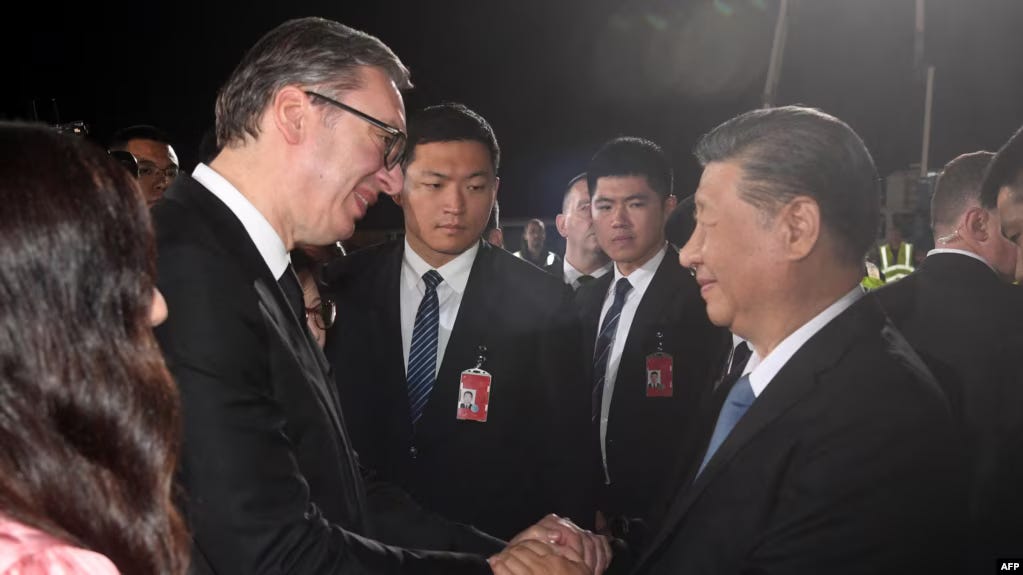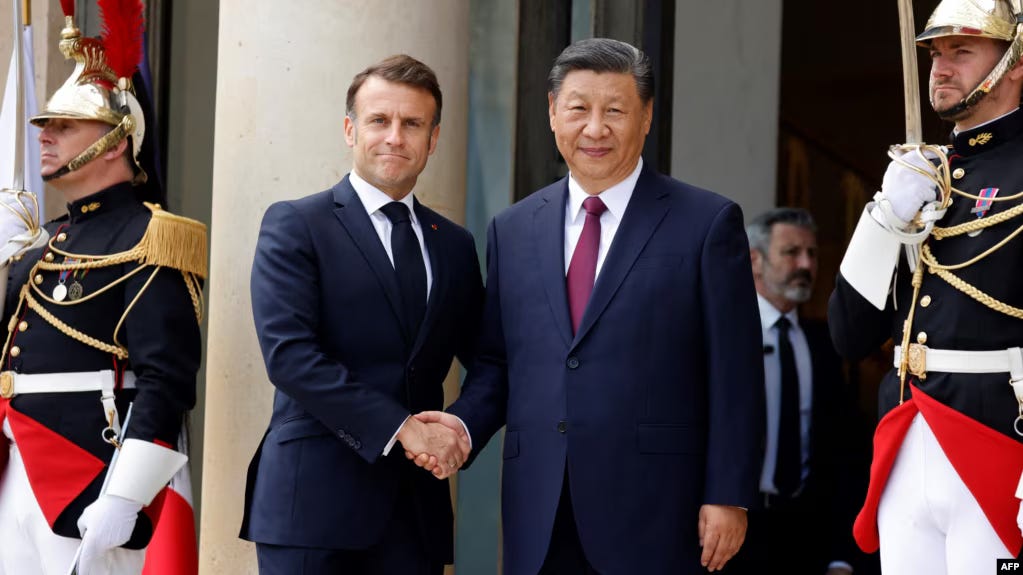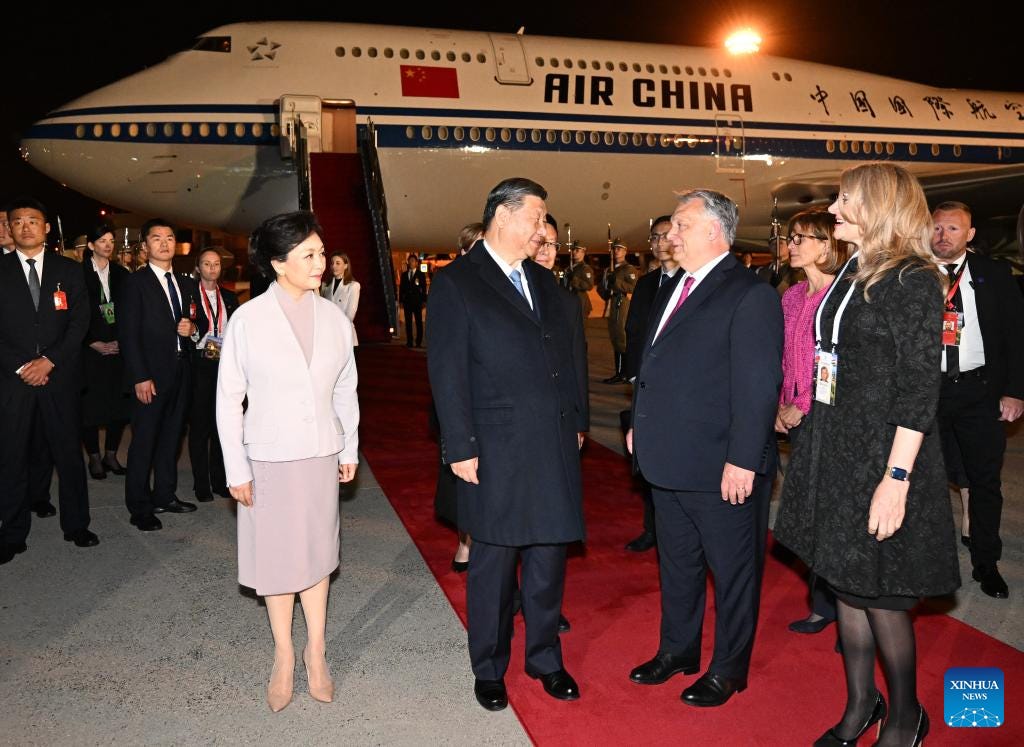[Our colleague Péter G. Fehér is based in Budapest and writes for Magyar Hírlap.]
Chinese President Xi Jinping visited Europe after five years. He visited three countries, France, Serbia and Hungary. The selection of the three states was not random. We can say this even if we know that France is a nuclear power, a member of NATO, and one of the leading powers of the EU. Serbia is not a member of the EU or the western defence alliance. Hungary is a member of both organizations, but it is one of the smaller states in the European community.
However, from a Chinese perspective, the three countries have several common features that are important to China. All three countries have reservations about American policy. Each of the three states, in different ways, is dissatisfied with the European Union. Furthermore, the “three” are concerned about the problems caused by global economic challenges. Finally, the three countries want to reposition themselves in the ongoing geostrategic realignment.

“Europe must reduce its dependence on the United States and avoid being dragged into the conflict between China and the United States over Taiwan” – French President Emmanuel Macron said in an interview he gave on board his plane a year ago after returning from a three-day state visit to China.
According to the French head of state, “Europe needs strategic autonomy to become a superpower under the leadership of France. As he said, there is a big risk that Europe "will get involved in a crisis that has nothing to do with it. This will prevent the EU from building its strategic autonomy.” The global geostrategic reorganization is already underway, and France is looking for its place in the new circumstances.
Germany’s economy is constantly weakening, so Berlin’s international influence is also decreasing, and its leading role in the EU has practically been called into question. France wants to fill the vacancy.
An important element of the Paris plan is for the EU to move economically away from America and closer to China. The card is also in the deck to keep France at an equal distance from Washington and Beijing. Needless to say, China likes the idea since it sees the United States as its main rival.

Xi Jinping’s talks in Paris, which were not just bilateral discussions, should be placed in this context. Ursula von der Leyen, president of the EU Commission, also took part in the negotiations. It is not by chance that Xi Jinping said that China views Europe as an important partner on the road to modernization, which also plays a prominent role in Beijing’s foreign policy. At the meeting, Emmanuel Macron also touched on trade relations, urging equal trade conditions – the state-supported foreign trade of the Chinese in particular causes problems for the French – between China and the EU.
We can’t go without saying anything about appearances either. The French staged an American-style show in honor of the Chinese president. The Élysée Palace was filled with star guests, just to name a few: Oscar-winning directors Jean-Jacques Annaud and Luc Besson, world-famous singer Mireille Mathieu and film star Sophie Marceau, the great musician Jean-Michel Jarre and his wife, the Chinese actress, Lida Guan, Paris-based Chinese Lang Lang, is the world’s greatest living pianist. But actress Salma Hayek and her billionaire husband were also there. A nice message to America: we can do it too.
Xi Jinping’s visit to Paris is surrounded by an atmosphere of rivalry with America. This is not surprising, because after WWII, especially during the presidency of General Charles de Gaulle, France pursued a strong anti-American policy. The legendary general had a hard time bearing the fact that the Americans ignored him during the war, did not consider him an equal partner, and this left a deep mark on him. De Gaulle even withdrew from NATO’s military wing in 1966. France returned to the Western military structure only in 2007, under the presidency of Nicola Sarkozy, who is of Hungarian origin.
Xi Jinping probably experienced real anti-Americanism in Belgrade. The date of the Chinese President’s visit on May 7 was not chosen by chance. The date of the visit is significant because on May 7, 1999, when NATO had already been bombing the former Yugoslavia for a month and a half. The Chinese embassy in Belgrade was also hit, and as a result of the attack, three journalists were killed and another twenty Chinese citizens were injured. Beijing was outraged and demanded an explanation, but NATO called the incident an accident.
The Chinese president last visited Belgrade in 2016. It was the first time in 32 years that a Chinese president visited Serbia. It was then that the strategic partnership agreement was signed. Vučić, president of Serbia, met the Xi Jinping in Beijing last October, at the One Belt, One Road forum.
Vucic’s visit to Beijing at the time is noteworthy because Serbia has been a candidate state for EU membership for ten years. However, with the exception of Hungary – Prime Minister Viktor Orbán took part in the meeting – the leaders of all EU countries stayed away from the gathering at that time. The two countries initialed 18 agreements, including the soon-to-enter free trade agreement. Beijing is already Belgrade’s largest foreign investor. This year, Chinese financing reached 20 billion dollars.
The Chinese president’s visit to Serbia also has a political element. Belgrade is under political siege. The EU constantly criticizes the Serbian president. Vucic is not in an easy situation. In the January elections, the president’s party, the Serbian Progressive Party, won an absolute majority in the parliament. The European Parliament, on the other hand, judged that the Serbian election was”not fair” because “Belgrade did not fulfill its obligations regarding free elections”.
Hungary and all states that do not accept the EU’s liberal policy must face such criticism. With the visit of the Chinese president, Belgrade sent a message to Brussels: we are not alone. Russia supports Serbia, but Moscow has been ignored by the EU in every respect since the outbreak of the war in Ukraine. Brussels cannot do this with China.

At the end of the European tour, Xi Jinping arrived in the Hungarian capital. The situation is characterized by the fact that the Chinese president spent three days in Budapest, two in Paris, and one in Belgrade. This means a globally increase in the value of Hungary. The EU also sounded the alarm. ”The purpose of Xi Jinping’s three-day visit to Budapest is to ensure that Hungary can help China acquire the market in the EU. Chinese goods could flood the EU market, which could pose a serious threat to Brussels” - according by the Euronews.
The report continues: “Renovation work is underway on the Budapest-Belgrade railway line, which is one of the symbols of China’s economic expansion in Hungary: 85 percent of the investment is covered by Chinese loans. Thanks to the modernization of the railways, with the cooperation of Hungary and Serbia, Chinese goods can reach Western Europe in the fastest way from the Greek port of Piraeus”, wrote Euronews, which also characterizes the situation as follows: China is building a bridgehead in Hungary. The possibility of this cannot be ruled out.
Last December, the Chinese BYD, the world’s largest car manufacturer, announced that it would build an assembly plant in Hungary, which would be the first European electric car manufacturing plant. The location was not chosen by chance either. The factory will be built directly on the Hungarian-Serbian border, probably in order to obtain labour from Serbia as well, and to export the new cars to non-EU member states through Serbia. Apparently, the Chinese intend to rely on both countries in South-Eastern Europe.
On the Hungarian side, they did not fail to emphasize that the visit of the Chinese president is of historical importance. Not only because the president of China came to Budapest after 20 years, but also because they signed economic agreements that can drastically accelerate the development of the Hungarian economy.
Good Serbian-Chinese relations also contribute to this. This concept seems to be confirmed by the joint Hungarian-Chinese agreement signed in Hungary. Among the 18 agreements, two points are also addressed by Serbia. One of them is a border station with a high throughput on the common border. The other is the oil pipeline connecting the two countries.
An important part of the agreement is that China plans significant industrial investments in the eastern, less developed region of Hungary. The Chinese are also investing in the modernization of the Hungarian railway network, the expansion of the network of charging stations for electric cars, and the construction of the railway infrastructure around Budapest.
The most interesting and important agreement: Hungary and China are preparing a cooperation program for the entire vertical of the nuclear industry. The purpose of this is that both countries can properly use the cheapest, safest and most efficient way of producing electricity.
There is a question to be answered here. To what extent does the strong relationship with China affect Hungary’s NATO membership? The answer: It does not affect it in any form.
A few days ago, the Hungarian Atlantic Council (A non-partisan social organization that analyzes Hungary’s NATO membership.) held its general meeting in Budapest. The debate was initiated by the Hungarian Minister of Defense, who made it clear: Hungary’s NATO membership has no alternative.



We Hungarians are happy about all foreign (peaceful) relations with all foreign countries that strengthen our country ! We must not forget that we have never been happy about foreign ambassadors interfering in the life and internal politics of our country in a commanding tone, who, considering themselves imperial governors, criticize our country daily, as Mr. (Mrs?) Pressman does, the US ambassador, and what, for example, the Chinese ambassador does never committed ! Somehow we are also not happy when the USA intervenes with millions of dollars in the election of our government, we Hungarians strangely like to elect ourself our own government, here dead people will not interfere in our election, as happened in some countries !
"The European Parliament, on the other hand, judged that the Serbian election was”not fair” because “Belgrade did not fulfill its obligations regarding free elections”."
Translation: you didn't get George Soros approval first; or that of the German green party and Klaus Schwab